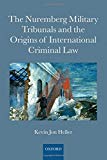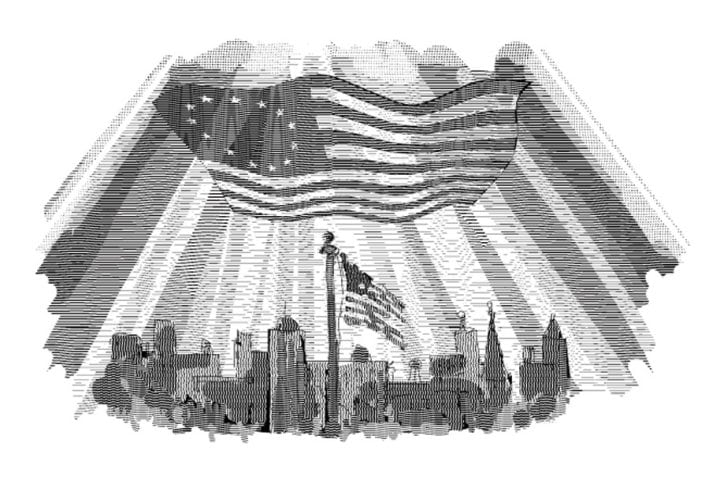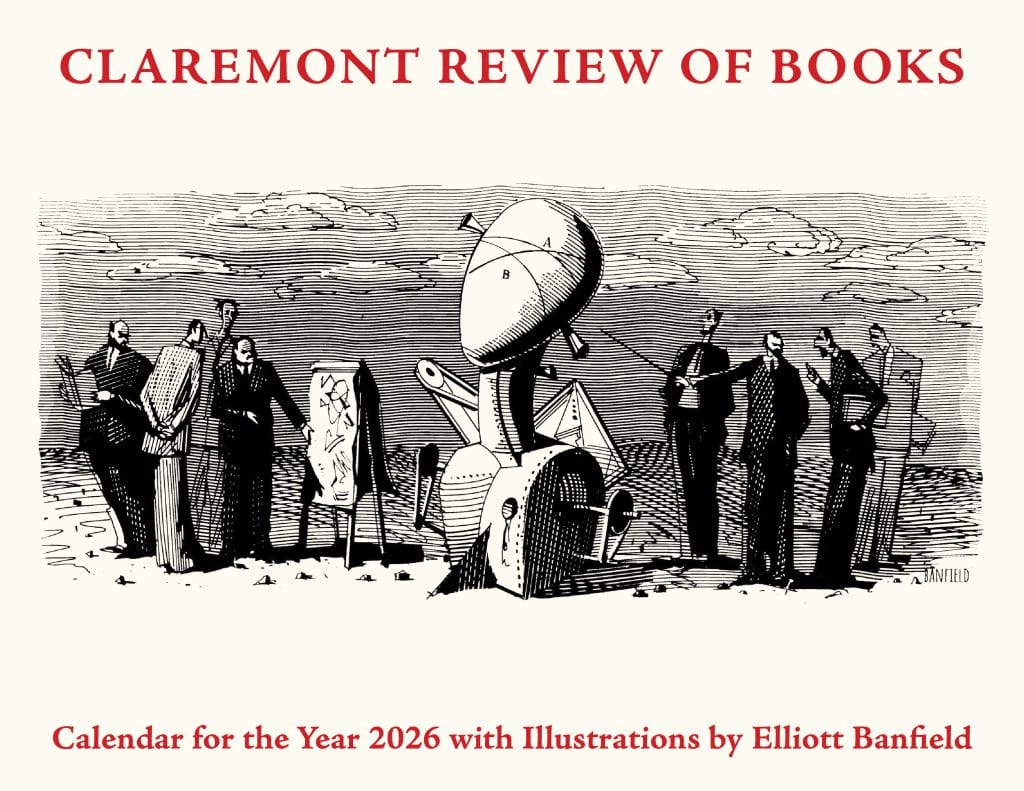Books Reviewed
A review of The Nuremberg Military Tribunals and the Origins of International Criminal Law, by Kevin Jon Heller and The International Criminal Court: Europe's Guantanamo Bay? by David Hoile.
International criminal law is now taught in law schools. It is a subject with its own specialized case books. It is treated as a well-established branch of law. But it is, in fact, quite new and not at all well-established.
If the Nuremberg trials mark the "origins of international criminal law," as Kevin Heller promises, then the International Criminal Court (ICC) is surely its contemporary culmination—and a very troubling one, as David Hoile demonstrates in this well-documented study. Together, these books illustrate the difficulties inherent in the notion of "international criminal law."
Many books have been written about the initial "international trial" of Hermann Goering and other top Nazis, in which the American prosecutors (led by Supreme Court Justice Robert Jackson) were reinforced by Soviet, British, and French counterparts. Heller's book offers the first detailed survey of the follow—on trials at Nuremberg. These trials were organized and implemented entirely by Americans, under the supervision of Jackson's successor, Telford Taylor.
There were twelve such trials, each with multiple defendants. Among them were a trial of Nazi medical officials for conducting ghoulish experiments on concentration camp inmates, a trial of top generals for ordering war crimes in the field and a trial of Nazi jurists for perverting the legal process accorded to enemies of the Reich. (The jurists trial was dramatized in the 1961 Hollywood film, "Justice at Nuremberg.")
Whether these were, in fact, "international" trials is a complicated question, to which Heller devotes considerable professorial attention—for which he is well-suited, as a law professor at the University of Melbourne. There had been international trials before 1945, but none had ever been entrusted with criminal trials. International arbitration tribunals (or "commissions," as they were sometimes called) had only been convened to judge disputes between states. International law was seen as a body of law exclusively concerned with the rights and duties of states toward other states—not with the liability of individuals to "humanity."
Nuremberg pioneered the term "crime against humanity" but "humanity" did not conduct the trials. In the first round of trials, indictments of "Goering et al." listed the four occupying powers in Germany as the prosecuting parties. The law they applied derived from an agreement of the same powers reached in London in the summer of 1945—after negotiations in which only these four states participated.
Heller expresses cautious approval for the view that subsequent endorsement by more than a dozen other states made the ensuing International Military Tribunal (IMT) "international." Yet the IMT, itself, in an early ruling held that it was exercising the "sovereign authority" of the occupying powers, delegated to them by Germany's "unconditional surrender." Even Heller acknowledges that the subsequent trials, conducted entirely by Americans, cannot reasonably be described as "international." On the other hand, as he reports, the judges insisted that they were not an extension of the American court system. They accordingly rejected efforts by German defense lawyers to invoke procedural rights conferred by American domestic law.
* * *
The confusion of German defense lawyers at the time was understandable. Though still called "military tribunals," all the judges in these courts were civilians. They were recruited from U.S. state courts because Chief Justice Harlan Stone (who viewed the proceedings quite disdainfully) refused to approve the participation of federal judges. It does not seem to have occurred to anyone to recruit foreign judges. Most of the prosecutors wore military uniforms. Some prosecutors were actually civilian lawyers on loan from non-military agencies, but they were all Americans.
Telford Taylor, an army colonel when he assisted Robert Jackson, was promoted to brigadier general when he became chief U.S. prosecutor in Germany. He not only chose the prosecution teams and assigned their cases but advised General Lucius Clay—the U.S. military governor in the American occupation zone—on the selection (and reappointment) of the judges. It is hard to imagine a civilian prosecutor enjoying such an opportunity to shape the bench he will face. It seems a bit less jarring, however, if they are all viewed as operating within the same military chain of command.
What was the law these judges applied? Most of the "war crimes" charges tracked prohibitions already codified in the 1899 Hague Convention on the Laws and Customs of War—which Germany had ratified at the time, as it subsequently ratified the 1907 revisions to this convention. Heller concedes that "crimes against peace"—plotting aggressive war—was a new category of crime, which was indeed vulnerable to German complaints about ex post facto justice. There were similar disputes about the new category of "crimes against humanity." In Heller's view, such disputes remain "academic."
Prosecutors hoped this new category would allow them to reach atrocities committed within Germany before the war, transforming the traditional state-to-state concerns of international law. For the most part, the judges at Nuremberg were not prepared to go along. No one was convicted for atrocities committed in Germany before the war. All those actually convicted of "crimes against humanity" were also found guilty of "war crimes" in foreign countries or wartime offenses connected with such "war crimes." Such convictions could be reconciled with earlier precedents in which the "law of war" had been enforced by military tribunals of the opposing power.
* * *
Though most of Heller's book focuses on somewhat technical questions of legal procedure, he does give revealing glimpses of the political background. Taylor brushed off protests (including some voiced on the floor of Congress) that his team of lawyers and investigators included too many people with left-wing associations, too many people who were foreign born, too many Jews. What Taylor could not ignore were pressures to scale back his prosecution efforts and speed up the trials. The U.S. military refused to fund prosecutions on a large scale or for an extended period. So while Taylor's staff had identified some 2500 "major war criminals" suitable for prosecution, only 177 (a mere 7%) were ultimately brought to trial. Political pressure also resulted in abandoning projected trials of major German industrialists. American officials (including the departing Robert Jackson) worried that such trials would stoke Communist propaganda against "capitalism." Some of the best known and most senior German generals (such as Field Marshals Gerd von Rundstedt and Erich von Manstein) were also spared prosecution on the insistence of U.S. military commanders, who were already seeking their advice on Russian war tactics.
The judges, in Heller's view, were not simply puppets of the prosecutors. The results seem to bear this out. Of the 177 defendants, 35 were acquitted—an acquittal rate (20%) that exceeds that of the International Criminal Tribunal for the Former Yugoslavia (ICTY), which was sponsored by the United Nations and began operating in the mid-1990s. The judges defined crimes with more care than the U.N. judges have sometimes done. Heller criticizes the U.N. judges for extending Nuremberg precedents (to justify convictions against Serb warlords), by misreading the actual holdings of the Nuremberg tribunals in some cases.
Nor were the sentences at Nuremberg particularly harsh, though (unlike the U.N. tribunals in the 1990s) American judges were still willing to impose capital sentences for the worst crimes, which they did in 25 cases. But as the trials proceeded, the political climate was changing. Many of these trials were still under way in the spring of 1948, when Stalin imposed a blockade of Berlin (relieved by a year long Allied airlift) and continued tightening Soviet control in the Russian occupation zone. American authorities began to worry about public opinion in the western occupation zones. And those parts of Germany, where opinions could be freely expressed, nearly all political parties—and leaders in the Catholic and Protestant churches—demanded an end to "revenge trials" and "victor's justice."
By 1950, with demands for clemency echoing in the new parliament of West Germany, the U.S. High Commissioner for Germany, John McCloy, initiated a review of Nuremberg sentences. He eventually decided on clemency in the majority of cases. As Heller reports, only 12 of 25 death sentences were ultimately carried out. Of the 38 defendants who were sentenced to prison term of 20 or more years, all were released within 10 years of their sentencing.
* * *
Nor do the trials seem to have had much of an educative effect on German opinion. Heller reports results from surveys in the American occupation zone (conducted by U.S. officials): In 1946 (at the start of these trials), some 40% of Germans endorsed the view that National Socialism was "a good idea badly carried out." Two years later (after most of these trials had been completed), the proportion of Germans holding to this view had risen to 55.5%. In 1946, 41% of Germans held that National Socialism was simply "a bad idea" but two years later, those giving this response had dropped to 30%. Racist views (as measured by polls) remained more or less the same, at about 60%. Heller concludes that the educational goal of these prosecutions was a "spectacular failure" but "might have been doomed from the beginning," given "the Germans' unyielding resistance to the war crimes" trials.
Would trials be more effective if removed from the distracting concerns of an occupying power? Ethnic strife following the break up of Yugoslavia prompted the U.N. Security Council to establish the International Criminal Tribunal for the Former Yugoslavia in 1993. It was hailed as the "first international war crimes tribunal since Nuremberg." Unlike the Nuremberg tribunals, this one was not an instrument of an occupying power, since the scattering of U.N. peacekeepers in Bosnia could not even keep the peace there, let alone control all the neighboring territories.
Still, people in Serbia noticed the new tribunal's sense of timing. It was not until six years after its creation that the ICTY indicted Serb President Slobodan Milosevic. The indictment was announced in 1999, just as NATO was bombing Belgrade in a dispute over the Serb province of Kosovo—at a time when nationals of NATO states predominated on the prosecution staff and on the tribunal's bench. After Milosevic was overthrown and subsequently extradited to the Hague, broadcasts of his trial actually revived his popularity. Before his sudden heart attack in 2006, pollsters found he had become the most highly esteemed politician in Serbia—despite all his failed wars and abuses of power while in office.
* * *
In 1994, the U.N. created a second international tribunal to prosecute perpetrators of the genocide in Rwanda—after the murderous Hutu government had already been overthrown by Tutsi rebels (whose fellow Tutsis had been the victims of the genocide). The new government was so exasperated by the delays and distractions characterizing this new Hague tribunal that it refused, for a time, to allow U.N. officials into Rwanda. Rwandan authorities did not question the tribunal's neutrality so much as its seriousness. Five years after the tribunal's creation by the Security Council, it had still not imposed final sentence on a single one the accused perpetrators in its custody. The International Tribunal seemed to think there was no urgency at all in responding to a genocide that had claimed nearly a million lives. In the same period, Rwandan authorities had completed prosecutions of some 5,000 perpetrators, though the international tribunal had ten times the resources of the new Rwandan judicial system.
These U.N. tribunals have been described as "ad hoc" responses to particular international challenges. Would a permanent, settled, genuinely international tribunal do better? Experience with the International Criminal Court, created by a U.N. conference in 1998, offers much reason for pessimism. As David Hoile documents, countries where the ICC has intervened have reacted in much the same way as the Serbs and the Germans before them. They regard themselves as victims of a very partial tribunal.
* * *
Hoile is a scholar now based in Britain but he has taught at universities in Sudan. One of this themes is that the Africans feel the ICC has singled out Africa for special attention. In the decade since the Court began operating in 2002, all the prosecution efforts have, in fact, been aimed at Africans. The African Union has passed resolutions of protest against the ICC. And African leaders indicted by the ICC, most notably Sudan's President Omar al-Bashir, have been openly embraced by other African leaders.
Such displays of solidarity might be chalked up to self-protectiveness in what is, for the most part, still a club of fellow dictators. Before his recent overthrow (and indictment by the ICC), Libya's Muammer Gaddhafi was the leading figure in the African Union (which, despite the name, is a toothless entity, sponsoring little more than hortatory resolutions). But Gaddhafi's enemies were no more inclined to heed the ICC than his former friends had been. Despite the ICC arrest warrant for Gaddhafi, rebels who cornered him in August 2011 decided it would be better, after all, to deliver him to a local morgue rather than hand him off to the international court in the Hague. Rebel authorities then refused to deliver Gaddhafi's son (also wanted by the ICC) to the Hague, insisting they would organize a Libyan trial for Gaddhafi's would-be heir.
Africans have reason to be wary. As Hoile notes, member states of the European Union provide some 60% of ICC funding and occupy a comparable portion of staff positions at the Hague. The E.U. has pressured its aid recipients in Africa and Asia to ratify the ICC treaty by threatening to withhold assistance from those that don't. And the E.U. has concentrated its aid in countries once held as European colonies. So the ICC is bound to be suspected of "neo-colonialism." Russia, China, India—countries that hold themselves out as alternatives to "Western hegemony"—have also held back from participating in the ICC. Europeans have denounced procedural flaws in Guantanamo military trials while showing no interest in somewhat comparable departures from normal criminal procedure in ICC rules.
* * *
But what this book actually documents is not some sinister scheme of Euro-domination but the remarkably broad discretion of the ICC Prosecutor, a post now held by Luis Moreno Ocampo of Argentina. In a decade in office, he has launched only a handful of prosecutions. His most publicized effort—charging genocide against Sudan's President Bashir for deaths in Darfur—rested on such questionable data that even the ICC's own pre-trial court ruled the genocide charge invalid (though the appellate panel ordered a reconsideration which revived the charge).
Hoile reports that the Prosecutor's figures for monthly casualties in Darfur were not just discordant but wildly incommensurate with figures calculated by human rights groups and academic experts: Moreno Ocampo claimed a death toll in excess of 5,000 a month, when others put the figure at between 100 and 200. The ICC has no means of gathering evidence on site. No one from the Prosecutor's office actually visited Sudan. Neighboring countries ignored the ICC's arrest warrant and openly received President Bashir in their capitals. More recently, African leaders have talked about organizing an Africa-only International Criminal Court which would displace the ICC from the continent.
Meanwhile, efforts to negotiate peace in Uganda between a democratic government and a murderous rebel force (the demented "Lord's Resistance Army" or LRA) were undermined when the ICC Prosecutor insisted he would go forward with attempted prosecutions of the rebels. The government offered an amnesty to rebels who laid down their armies—a strategy that has often smoothed the path to peace, as in the Central American civil wars of the 1980s or the American Civil War of the 1860s. The ICC refused to countenance any sort of amnesty. And the LRA has continued to massacre civilians. The threat remains so severe that in October 2011, President Obama agreed to send U.S. military advisors to assist in the ongoing struggle against this Central African scourge.
The ICC is dedicated to "justice" or, as Moreno Ocampo has proclaimed, to "ending impunity." The claim is so intoxicating that Moreno Ocampo, like other high-level bureaucrats, seems to have been indifferent to ordinary good management. Hoile reports an episode which only a handful of Western media outlets thought worthy of notice: an ICC staffer accused the Prosecutor of coercing sex from a female journalist in 2005 and Moreno Ocampo then had the accuser terminated from the Court's employ. An appendix to Hoile's book reprints the decision of an international arbitration award repudiating the accuser's termination.
Hoile also reprints the text of a letter from Human Rights Watch, warning the Prosecutor about patterns of mismanagement in his office. The tone of the letter implies that the Prosecutor must account to this non-governmental organization for his performance—which proved, of course, a wild overestimation of NGO leverage. Moreno Ocampo will remain in office to the end of his term in June 2012. In December of 2011, governments participating in the ICC treaty agreed that he should be replaced by Fatou Bensouda-Moreno Ocampo's deputy prosecutor since 2004—whose main prior experience was at the ill-fated International Tribunal for Rwanda. International bureaucracies, like most bureaucracies, look after their own.
Perhaps it is not surprising that people do not trust outsiders claiming to deliver justice to them—without their consent. Of course, genuine evil-doers don't want justice imposed on themselves under any conditions. In this world, justice almost always requires coercion. But it makes a difference if those who wield the sword of justice are at least connected with the community in which justice is enforced.
It was highly optimistic to think Germans would see American justice as true justice, when imposed by a conquering army. But at least, when the United States embarked on its trials at Nuremberg, America had already conquered Germany—and then stayed to preserve minimal order, assure food supplies, reconstruction assistance, and defense against Soviet armies next door. If the trials did not succeed in their "educational goal," if they were subordinated to larger priorities, still the larger American project—to establish a secure democracy in western Germany—did prevail.
* * *
The European governments that launched the ICC in the late 1990s had no comparable commitment to the countries that would be judged by ICC. European governments no longer have the capacity to provide actual protection to countries outside Europe. Instead they offer "justice." It is, of course, justice without the sword. It is justice without involvement or responsibility. We might call it hit-and-run justice.
The ICC was launched in the era that followed the collapse of Communism but preceded the attacks of 9/11—sometimes called "the holiday from history." Two centuries earlier, our Declaration of Independence spoke of "the course of human events," implying an intelligible pattern, a set of recurring challenges, in which some "causes" may "impel" men to adopt "necessary" political actions. By the 1990s, many Europeans (and quite a few American legal scholars) thought it would be nice to escape all that calculating and just rely on nice people in the Hague to ensure justice. Then we wouldn't have to take sides, pay for costly swords, think at all about cause and effect or anything else.
Punishment of crime is one of the noblest aims of political community. All existing political communities fall short of their own aims; some disdain even to embrace decent standards as an aim. We rightly honor visionaries who—as we sometimes say—"dared to dream" of a higher standard of justice.
But it is unfair to rank the architects of the International Criminal Court in their number. International criminal justice is not so much a dream of justice as a dream of escape. It is the dream of sleepers whose highest priority is to remain in the oblivion of blissful slumber. Justice? Security? Stability? We have good people at the Hague working on all that! Give us a wake-up call in 1999.







